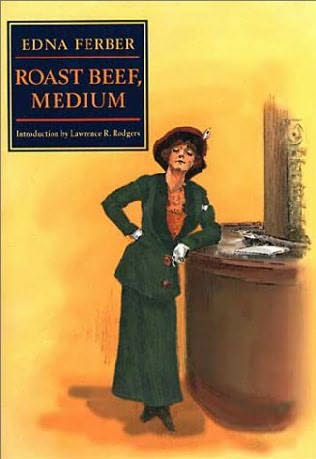
We don’t have an American equivalent of Mrs. Tim of the Regiment, D. E. Stevenson’s classic humorous novel (soon to be reissued by Bloomsbury) about an army wife whose diary regales us with her adventures as a versatile housewife, ebullient mother of two precocious children, and charming friend who helps other army wives adapt to their gypsy life. This novel is a darling of the D. E. Stevenson Yahoo group, an online group devoted to discussion of her novels. And because the book is so popular, I’ve been racking my brains for an American equivalent. In vain.
For some peculiar reason, however, the tone of Edna Ferber’s delightful collection of short stories, Roast Beef, Medium: The Business Adventures of Emma McChesney (1913), puts me in mind of Mrs. Tim. It’s not that the heroine has much in common with Mrs. Tim - Emma McChesney is perhaps the only a successful traveling saleswoman in literary history, a stellar employee of T. A. Buck’s Featherloom Petticoats. Her domestic situation is utterly different from Mrs. Tim's, too, as she is the divorced mother of a 17-year-old son. But her sense of humor, friendliness, and resilience are an American rendition of Mrs. Tim.
“Roast Beef, Medium is not only a food. It is a philosophy,” Edna Ferber writes in the preface to the collection.
The title refers to the only consistently good road food, in Emma's opinion: roast beef. On the road, Emma daydreams about the Sunday dinners she could cook if she were an ordinary housewife. Roast beef becomes a metaphor for the family life she feels she is missing, though none of the women she knows lead that life,. After five months on the road in small towns she wants nothing more than to eat a good dinner in Chicago and see a show. But, tired from a long day of the business she simultaneously adores and is cynical about, she watches other housewives in the small towns.
“As Emma McChesney loitered, looking in at the shop windows and watching the women hurrying by, intent on the purchase of their Sunday dinners, that vaguely restless feeling seized her again. There were rows of plump fowls in the butcher-shop windows, and juicy roasts. The cunning hand of the butcher had enhanced the redness of the meat by trimmings of curly parsley....There came over the businesslike soul of Emma McChesney a wild longing to go in and select a ten-pound roast, taking care that there should be just the right proportion of creamy fat and red meat.... She ached to turn back her sleeves and don a blue-and-white checked apron and roll out noodles.”
Emma doesn't have a boyfriend, though men try to pick her up. She has a competitive relationship with a salesman for a rival petticoat company, a fat, talented pianist who likes to play the piano in hotel lounges. Her women friends work in department stores - and she makes friends on a train with an actress. Her son takes her money for granted until she takes him on the road and he finds out how difficult the life is.
Edna Ferber is known for big old-fashioned novels like So Big (for which she won the Pulitzer) and Giant (which was made into an incredibly good movie with Elizabeth Taylor and James Dean). I always thought they were supposed to be bad novels - not read anymore, anyway - but these stories, which I discovered at Gutenberg, are superb. There are two sequels, Personality Plus: Some Experiences of Emily McChesneyand her Son, Jock (1914), and Emma McChesney & Co. (1915).
The books are in print: the University of Illinois publishes the entire trilogy in one volume. But you can also read them free at Gutenberg and manybooks.net. I read these stories happily on my Sony Reader today.
2 comments:
Is it the sort of self-deprecating humor so common to women's novels from _The Egg and I_ and Delafield to today _Bridget Jones's Diary_? If so, then the attraction is it's applied to going out to work for money instead of staying in to work for money (or support).
I like these when I enjoy what's being made fun of -- identify with it on some level and have a cathartic experience.
Julia and Julie is all about food too. Women have long been identified with food; that's one reason it's so ironic they should be driven to anorexia.
Ellen
The fascinating thing about Emma McChesney is that she ISN'T particulalry self-deprecating, though she is very funny. She's confident in the workplace, has had to fight for her place among men, and is philosophical about her role in life. But she does sometimes yearn to be home, though she is a charming barracuda in sales and loves her work.
I adore Betty MacDonald and Bridget Jones's Diary, and their humor does run to self deprecation. Making fun of themselves is one of their keys to survival. Emma McChesney is probably a little more like Mrs. Tim and Delafield's Provincial Lady. Those two are witty and cope beautifully, and the Provinical Lady works as a housewife and writer. In Mrs. Tim Takes a Job, Mrs. Tim works in a hotel and becomes indispensable.
Yes, food is very much at the heart of Roast Beef, Medium. On one of Emma's days off, she takes an actress she has met on a train to lunch at the home of a department store manager, and the three women make a fabulous lunch and share the secret of caramel frosting.
I want to read Julie & Julia. I loved the character Julie. I read that Julia Child's cookbooks are sold out in stores. I imaging Julie & Julia is also enjoying a good run!
Post a Comment